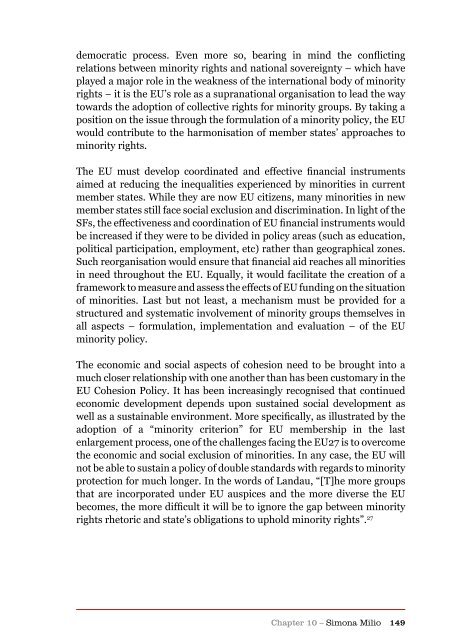Authors Iain Begg | Gabriel Glöckler | Anke Hassel ... - The Europaeum
Authors Iain Begg | Gabriel Glöckler | Anke Hassel ... - The Europaeum
Authors Iain Begg | Gabriel Glöckler | Anke Hassel ... - The Europaeum
You also want an ePaper? Increase the reach of your titles
YUMPU automatically turns print PDFs into web optimized ePapers that Google loves.
democratic process. Even more so, bearing in mind the conflicting<br />
relations between minority rights and national sovereignty – which have<br />
played a major role in the weakness of the international body of minority<br />
rights − it is the EU’s role as a supranational organisation to lead the way<br />
towards the adoption of collective rights for minority groups. By taking a<br />
position on the issue through the formulation of a minority policy, the EU<br />
would contribute to the harmonisation of member states’ approaches to<br />
minority rights.<br />
<strong>The</strong> EU must develop coordinated and effective financial instruments<br />
aimed at reducing the inequalities experienced by minorities in current<br />
member states. While they are now EU citizens, many minorities in new<br />
member states still face social exclusion and discrimination. In light of the<br />
SFs, the effectiveness and coordination of EU financial instruments would<br />
be increased if they were to be divided in policy areas (such as education,<br />
political participation, employment, etc) rather than geographical zones.<br />
Such reorganisation would ensure that financial aid reaches all minorities<br />
in need throughout the EU. Equally, it would facilitate the creation of a<br />
framework to measure and assess the effects of EU funding on the situation<br />
of minorities. Last but not least, a mechanism must be provided for a<br />
structured and systematic involvement of minority groups themselves in<br />
all aspects – formulation, implementation and evaluation – of the EU<br />
minority policy.<br />
<strong>The</strong> economic and social aspects of cohesion need to be brought into a<br />
much closer relationship with one another than has been customary in the<br />
EU Cohesion Policy. It has been increasingly recognised that continued<br />
economic development depends upon sustained social development as<br />
well as a sustainable environment. More specifically, as illustrated by the<br />
adoption of a “minority criterion” for EU membership in the last<br />
enlargement process, one of the challenges facing the EU27 is to overcome<br />
the economic and social exclusion of minorities. In any case, the EU will<br />
not be able to sustain a policy of double standards with regards to minority<br />
protection for much longer. In the words of Landau, “[T]he more groups<br />
that are incorporated under EU auspices and the more diverse the EU<br />
becomes, the more difficult it will be to ignore the gap between minority<br />
rights rhetoric and state’s obligations to uphold minority rights”. 27<br />
Chapter 10 – Simona Milio 149

















